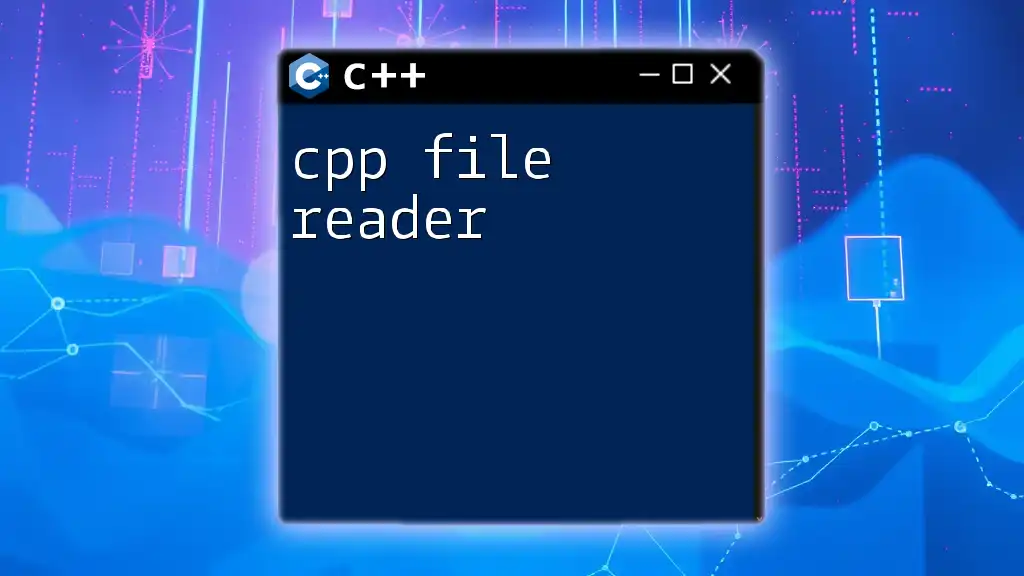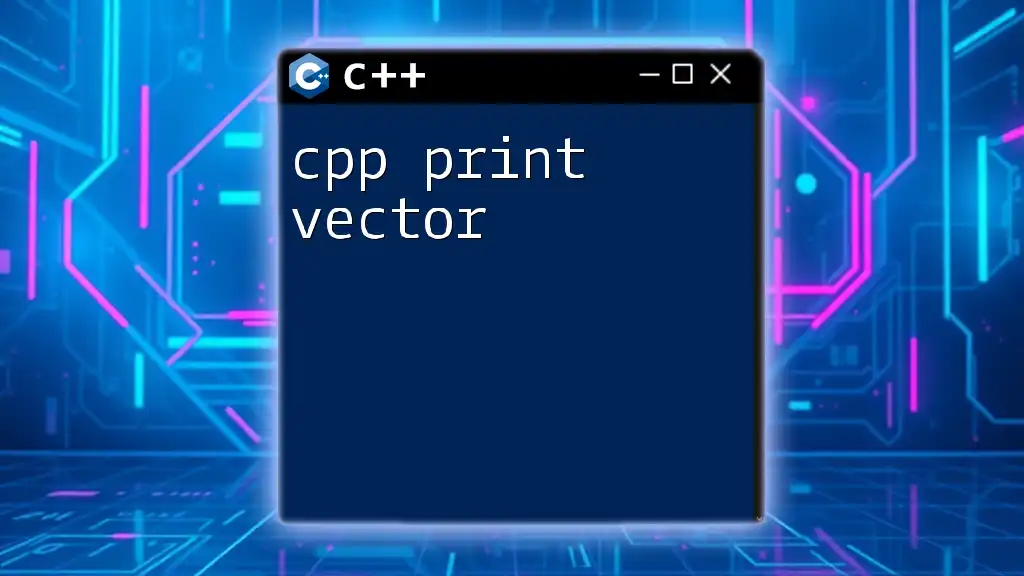A C++ unit test framework provides a structured way to create and run automated tests to verify that individual units of code (such as functions or classes) work as intended.
#include <cassert>
void testAddition() {
assert(2 + 2 == 4);
}
int main() {
testAddition();
return 0;
}
Understanding C++ Unit Testing Frameworks
What is a Unit Test Framework for C++?
A unit test framework for C++ is a set of tools and libraries designed to create and manage unit tests, enabling developers to verify that their code behaves as expected. Unit tests are small, isolated tests that focus on individual components or functions, ensuring that each part of the software works correctly before integrating it with larger systems.
These frameworks provide a structured method for defining test cases, running tests, and reporting results, thus improving code reliability and facilitating smoother development processes.
Architecture of a C++ Unit Test Framework
The architecture of a typical C++ unit test framework consists of several key components:
- Test Cases: Individual tests that validate specific functionality.
- Test Suites: A collection of test cases grouped together, typically sharing a common set of prerequisites.
- Test Runners: Tools or scripts that execute the tests, collect results, and report on their success or failure.

Popular C++ Unit Testing Frameworks
Google Test (gtest)
Google Test is an extensively used C++ testing framework developed by Google. It offers a rich set of assertion macros and supports automatic test discovery.
Setting Up Google Test
To install Google Test, you can clone the repository from GitHub:
git clone https://github.com/google/googletest.git
cd googletest
mkdir build
cd build
cmake ..
make
sudo make install
Writing Your First Test
Here is how to write a basic test using Google Test:
#include <gtest/gtest.h>
// Function to be tested
int Add(int a, int b) {
return a + b;
}
// Test case
TEST(AdditionTest, PositiveNumbers) {
EXPECT_EQ(Add(1, 2), 3);
EXPECT_EQ(Add(2, 3), 5);
}
int main(int argc, char **argv) {
::testing::InitGoogleTest(&argc, argv);
return RUN_ALL_TESTS();
}
In this code snippet, `Add` is the function being tested. The `TEST` macro defines a new test case, while `EXPECT_EQ` checks if the actual output matches the expected result. Running the main function will execute all defined tests.
Running Tests and Analyzing Results
To run the test, compile the code and execute the resulting binary. Google Test will report the results, detailing which tests passed and which failed, allowing developers to quickly identify issues.
Catch2
Catch2 is another popular C++ unit testing framework known for its simplicity and expressive syntax. It is a single-header library, making setup convenient.
Advantages of Using Catch2
- Its natural syntax allows for writing tests that are easy to read and understand.
- Supports BDD-style testing, which improves collaboration between developers and non-technical stakeholders.
How to Install Catch2
To use Catch2 in your project, include the single header file:
#define CATCH_CONFIG_MAIN
#include <catch2/catch.hpp>
Writing and Running a Test in Catch2
Here is an example of a simple test using Catch2:
#include <catch2/catch.hpp>
// Function to add two integers
int Add(int a, int b) {
return a + b;
}
TEST_CASE("Addition of positive numbers") {
REQUIRE(Add(1, 1) == 2);
REQUIRE(Add(2, 3) == 5);
}
The `TEST_CASE` macro defines a context for the test, while `REQUIRE` checks the conditions. You can run this program just like a standard C++ application, and Catch2 will provide test output.
Boost.Test
Boost.Test is part of the Boost C++ Libraries and offers a robust set of features.
Strengths of Using Boost.Test
- Extensive documentation and community support.
- Supports both unit testing and more extensive integration tests.
Steps to Install Boost.Test
If you have Boost installed, you can add Boost.Test by linking your project against the appropriate libraries.
Writing an Example Test Case with Boost.Test
Here’s a basic example of a unit test written using Boost.Test:
#define BOOST_TEST_MODULE MyTests
#include <boost/test/included/unit_test.hpp>
// Function to subtract two integers
int Subtract(int a, int b) {
return a - b;
}
BOOST_AUTO_TEST_CASE(subtract_test) {
BOOST_CHECK(Subtract(5, 3) == 2);
BOOST_CHECK(Subtract(5, 5) == 0);
}
In this example, `BOOST_AUTO_TEST_CASE` defines a new test case, and `BOOST_CHECK` ensures the conditions are satisfied. Running this code will yield a report on the state of your tests.

Other Notable C++ Unit Testing Frameworks
While Google Test, Catch2, and Boost.Test are among the most popular choices, several other frameworks are worth exploring:
CPPUnit
CPPUnit is a C++ implementation of the famous JUnit testing framework. It allows for writing tests that are simple and focuses on OOP principles.
UnitTest++
UnitTest++ is a lightweight C++ testing framework that provides a simple API and runs tests efficiently.
Google Mock
Google Mock is part of Google Test and offers strong capabilities to mock dependencies within your tests. This allows for isolated testing of code components.

Best Practices for C++ Unit Testing
Structuring Your Tests
Well-structured tests are easier to maintain and understand. Consider organizing tests into fixtures, where groups share common setup code.
Writing Effective Test Cases
Effective test cases are clear and concise. Follow the Arrange, Act, Assert (AAA) pattern for structuring your tests. This pattern improves readability by clearly defining setup, execution, and verification stages.
Avoiding Common Mistakes in Unit Tests
It's crucial to avoid testing implementation details instead of behavior. Focus on the observable outcomes of your functions rather than their internal workings.

Sample Test Case Implementations
Example 1: Basic Arithmetic Operations
#include <gtest/gtest.h>
int Multiply(int a, int b) {
return a * b;
}
TEST(MultiplicationTest, PositiveNumbers) {
EXPECT_EQ(Multiply(2, 3), 6);
EXPECT_EQ(Multiply(4, 5), 20);
}
In this example, the test verifies the Multiply function to ensure it produces the correct results with positive integers.
Example 2: Testing Class Behavior
#include <gtest/gtest.h>
class Counter {
public:
Counter() : count(0) {}
void Increment() {
count++;
}
int GetCount() const {
return count;
}
private:
int count;
};
TEST(CounterTest, IncrementsCount) {
Counter counter;
counter.Increment();
EXPECT_EQ(counter.GetCount(), 1);
}
Here, the Counter class's behavior is tested to ensure the increment function works as expected.
Example 3: Mocking Dependencies
Mocking allows for isolated testing and is especially helpful when dealing with external components.
#include <gmock/gmock.h>
#include <gtest/gtest.h>
class Database {
public:
virtual std::string GetData() = 0;
};
class MockDatabase : public Database {
public:
MOCK_METHOD(std::string, GetData, (), (override));
};
TEST(DatabaseTest, UsesMock) {
MockDatabase mockDb;
EXPECT_CALL(mockDb, GetData())
.WillOnce(::testing::Return("Mocked Data"));
EXPECT_EQ(mockDb.GetData(), "Mocked Data");
}
In this example, a mock database class is created to simulate a dependency, demonstrating how to test a method that relies on external data without making actual database calls.

Integrating Unit Testing into Your Workflow
Continuous Integration (CI) and Unit Testing
Integrating unit tests into your Continuous Integration (CI) process ensures that tests are automatically run with each code change. This helps catch bugs early and facilitates better software quality.
Popular CI Tools for C++ Development
- Travis CI: Easy to set up with GitHub repositories.
- CircleCI: Provides robust support and customization options.
- Jenkins: Highly extensible for various workflows.
Test Coverage and Reporting Tools
Measuring code coverage gives insights into untested parts of your code, helping improve overall test quality. Tools like gcov and lcov can be used to generate reports on test coverage, guiding developers on areas that may require additional tests.

Conclusion
Unit testing in C++ is a powerful practice that enhances code reliability and simplifies debugging. By utilizing frameworks like Google Test, Catch2, and Boost.Test, developers can easily integrate effective testing into their workflows. Embracing best practices and leveraging CI processes ensures that unit testing becomes a valuable part of your development lifecycle.

Frequently Asked Questions (FAQs)
What is the best C++ unit testing framework for beginners?
For beginners, Google Test is widely recommended due to its extensive documentation and straightforward setup.
How can I improve my unit tests?
Focus on writing clear and concise tests, avoid testing implementation details, and utilize mock objects when necessary.
When should I write unit tests during development?
It's advantageous to write unit tests in parallel with your code, using test-driven development (TDD) to ensure functionality is tested from the start.

















